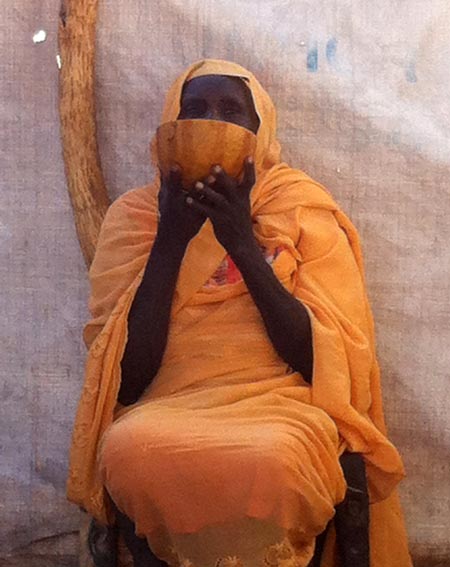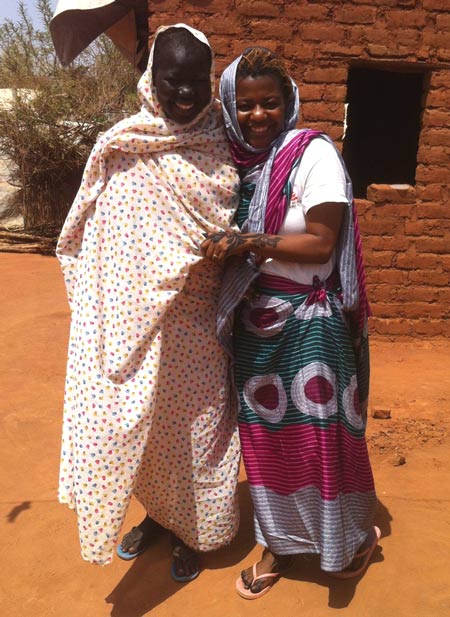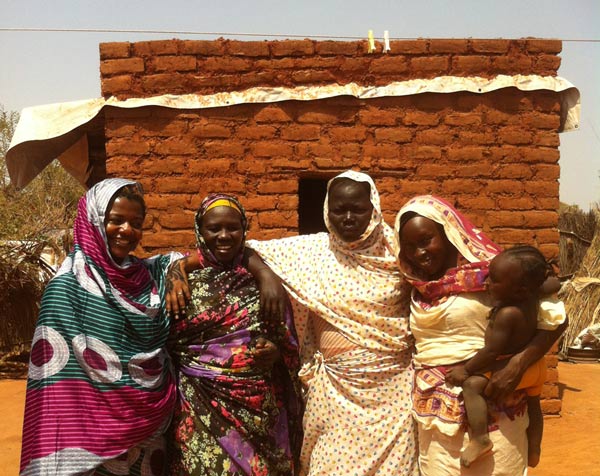19/2/16 for DUNIA – During briefing prior to departure to post, there was emphasis on dress code while in the field. Most cultures especially in Africa and the Middle East are conservative in dressing particularly when it comes to women.
Yida is not a predominant Muslim society but every female is wrapped up in some of the most colorful wraps you can think of. It seems like the brighter the color, the better for everyone. This is common among all age groups, except for the recent widow, who wears all white.
With everyone all wrapped up, there are subtle markers to identify single versus married women but one has to look closely. One identifier is the use of henna. Married women have their feet and hands all covered in black henna. Sometimes the hand henna wears off due to constant washing but they make sure that the feet are with henna at all times. So, the gentlemen don’t only look at the hands but mostly the feet to be certain of who’s single or not.
Also by Mirabelle Adamu-Zeh, PharmD | My First Mission With Médecins Sans Frontières (MSF)
So, I asked one of the female national staff who had beautiful designs all over the hands if I could also have it done. There was a big NO from the male, but they won’t tell me the reason. I decided to find this female staff later on and she explained and even promised to do my design since I confirmed my marital status. Aaaahhh……the privilege of a married woman..!
I cannot talk about the women of Yida without mentioning that only 5% of them are a part of the skilled working force here. About 95% of the staff are male (nurses, nurse aids, nurse consultants, pharmacy assistants, logisticians, security guards, and administrators). At least, I was glad to see a few cooking both for the hospital and expat house.
History continues to show the systematic oppression of women, made even more visible in resource limited settings, during epidemics, and armed conflict. In such settings, women are restricted to the narrow sphere of activity in society, subjected to violence, denied educational opportunities, frequently treated as less than human, hence they are prevented from realizing their true potential (The Equality of Women and Men, NSA-USA).
Every aspect of life is pervaded by laws created by men, age-old forms of subordination in the culture, and unchanged, often unexamined inherited traditions. In the case of Yida, women are married off quite young. This may be due to armed conflict that the country has been involved in for long and the need to continue the family as she becomes the caretaker when men go off to war. Also, procreation tops the list of why females are needed here, hence, they get no or limited education.
The denial of equality for half of the society (women) promotes destructive attitudes and habits in both men and women that can be seen to pass from one generation to the next in a family, work place, nationally and eventually international relations. Working here, it has become very clear to me that we need a new understanding of who we are, what is our purpose in life, and how we relate to one another to reshape our lives and society.
The Baha’i Writings state that “as long as women are prevented from attaining their highest possibilities, so long will men be unable to achieve the greatness which might be theirs”. Looking at the context of humanity, this makes sense if we regard the world as a bird having two wings; male and female. So long as the two wings of the bird are not equivalent in strength, the bird does not fly (for long).
There have always been many justifications for keeping women socially and economically disadvantaged such as our unique motherhood ability. This is a noble station bestowed upon us and more importantly we are the first educators of our children. So, what more important role can we play in shaping the minds and characters of the next generation if we ourselves know no better?
We have to face the challenge of fully participating in all aspects of life while simultaneously honoring motherhood. This is the reason men must be part of the movement and backbone to promote the equality of women. Their willingness to take responsibilities for equality will create the best environment for progress. It has been said that “women and men have been and will always be equal in the sight of God” (Baha’u’llah).
After all is said and done, I see so much potential in the women here but no means of fostering these skills. Take for example Kiki, who did my beautiful henna design. She has no educational background but is amazingly creative with her hands and has a keen mind, and attention to details. I was very impressed by her focus, and the technique she uses. I asked her how she learned to create such beautiful designs and she murmurs that her grandmother taught her the art. She’s one of the most sort out designers here in the camp especially during special occasions and that is how she earns her living.
Join mailing list for updates and monthly newsletters




Thank you Neh. Your voice is very important and needs to be heard. You are speaking for all the women you see as well as those you don’t. Great Article!!!